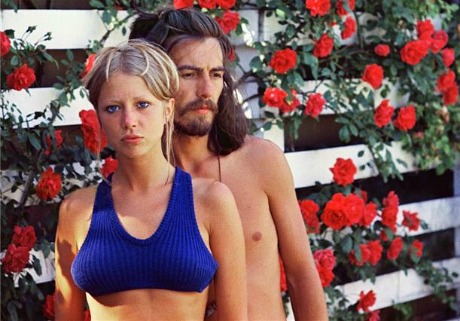I saw the first half of Martin Scorsese‘s 208-minute George Harrison doc during the Telluride Film Festival, and was only somewhat impressed. It covered the first 23 or 24 years of Harrison’s life, or ’43 to ’69…and I felt I knew all that going in. But the second half, which I finally saw at a New York Film Festival screening, is highly nourishing and affecting and well worth anyone’s time.
Yes, even for the guys like LexG who are sick to death of boomer-age filmmakers and film executives endlessly making movies about their youth. It’s not unfair for them to feel this way because boomers have been commercially fetishizing their ’60s and ’70s glory days for a long time. But George Harrison: Living In The Material World, which debuts tonight on HBO, is still a very good film. Particularly Part Two.
Because it’s about a journey that anyone who’s done any living at all can relate to, and about a guy who lived a genuinely vibrant spiritual life, and who never self-polluted or self-destructed in the usual rock-star ways.
Well, that’s not true, is it? Harrison died of lung cancer that he attributed to his having been a heavy smoker from the mid ’50s to late ’80s. And he wasn’t exactly the perfect boyfriend or husband. (There were a few infidelities during his marriage to Olivia Harrison.) And he wasn’t the perfect spiritual man either, despite all the songs and talk about chanting and clarity and oneness with Krishna. He had his bacchanalian periods. And he did so with the wonderful luxury of having many, many millions in the bank. It’s not like Harrison was struggling through awful moments of doubt and pain in the Garden of Gethsemane.
But this journey is something to take and share.
The film is entirely worth seeing for a single sequence, in fact. One that’ll make you laugh out loud and break your heart a little. It’s a story that Ringo Starr tells about a chat he had with Harrison in Switzerland two or three months before his death in November ’01. I won’t explain any more than this.

In today’s N.Y. Times review critic Mike Hale noted that Scorsese and Harrison “were two questing minds, raised in Roman Catholic families, who were drawn to Asian philosophies and art and driven to stump for them in the West; two reserved but powerfully controlling and perfectionist artists; two men conscious of their roles as standards keepers and cultural influencers.” So there’s your personal element that exists beyond mere nostalgia and/or reliving the surge of one’s youth.
Scorsese’s doc has no title cards, no narration, no through-line interview as Bob Dylan: No Direction Home had. It just kind of glides along and swirls around and comes together, although I have to say that I found Part One a little slipshod and patch-worky at times. The editor is David Tedeschi, who also cut No Direction Home as well as Scorsese’s Public Speaking, the Fran Lebowitz doc, and Shine a Light, the 2008 Rolling Stones’ concert doc.
Part Two, as you might presume, is about Harrison’s solo career. It starts with the Beatles breakup, the making of All Things Must Pass, the 1971 Concert for Bangla Desh, etc. And then settles into the mid to late ’70s and ’80s, “Crackerbox Palace,” Handmade Films, “Dark Horse,” the Travelling Willburys, the stabbing incident and so on.
From my “Harrison of Liverpool” piece which ran on 7.17:
“Beatle lore-wise, Harrison was regarded early on as the solemn one, the deep spiritual cat (i.e., the last one to leave Maharishi Mahesh Yogi‘s ashram in Indian in late ’67) and to some extent the political commentator and satirist (the lyrics of “Piggies” and “Savoy Truffle“, ‘the Pope owns 51% of General Motors,’ etc.).
“Read this account of George and Patti Boyd Harrison’s brief August 1967 visit to San Francisco’s Haight-Ashubry district, which by that time was the pits.
“I also remember a story in an anonymous groupie tell-all book about a girl giving Harrison a blowjob at a party while he played the ukelele, and after it was over his getting up and saying ‘thanks, luv!’ and leaving the room without asking her name. Funny.
“Harrison died of lung cancer at age 58 on November 29, 2001, in Los Angeles. His Wiki bio says “he was cremated at Hollywood Forever Cemetery and his ashes were scattered in the Ganges River by his close family in a private ceremony according to Hindu tradition. He left almost 100 million pounds in his will.”
Update: Here’s a slam piece by Slate‘s Bill Wyman.









